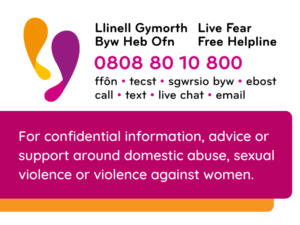
When someone speaks out publicly about personal experiences of violence or abuse, or a high profile case is covered in the media, similar comments and responses come up time and time again. These include;
“Well, they should have left the relationship sooner.”
“What did they expect, walking home alone at night?”
“They probably shouldn’t have drunk so much.”
“But what were they wearing?”
These are all examples of victim blaming.
What is victim blaming?
Victim blaming is any response that explicitly states or implies that the victim is to blame for the abuse they have experienced.
Like the examples above, victim blaming often revolves around actions that a victim could have taken (or not taken) to avoid experiencing abuse. In reality, violence and abuse will happen regardless of the victim’s choices.
Whether intentional or unintentional, victim blaming can cause serious harm to survivors of domestic abuse and sexual violence, leaving them feeling responsible for their abuser’s actions, therefore increasing feelings of shame and guilt.
Blaming victims for their own abuse is never acceptable, abusers are solely to blame.
What effect does this have on survivors?
The scars left from abuse are not just physical. Experiencing emotional, physical or sexual violence can have long-term psychological impacts on a survivor, including self-doubt and low-self-esteem. This is why a supportive response to a disclosure of abuse is so important on the journey to recovery.
One of the greatest barriers to seeking help and reporting abuse is the victim feeling they are to blame for what has happened to them. When people speak or behave in a way that reinforces this feeling of self-blame, the impact of the abuse may be greater, leading to a longer recovery.
When someone places the blame on a survivor, it invalidates their experiences, enhancing their feelings of isolation and self-doubt.
Victim blaming may also discourage a survivor from speaking up again or seeking any form of justice or support, through fear that they will not be believed.
In contrast, positive responses (where victim blaming attitudes are not present) can reduce feelings of post-traumatic stress, depression and health issues.
What is a more helpful response?
If someone tells you that they have experienced abuse, rather than focusing on what they could have done differently, think about how you can support them moving forward.
Listen to them, believe them, and let them know that it is never their fault. Look to the future, and their healing journey, by empowering them in their next steps.
We have a host of online resources to learn about different kinds of abuse here.
You can also signpost survivors to the Live Fear Free helpline for 24/7 free confidential support and advice on domestic abuse, sexual violence, coercive control and stalking.
Call 0808 80 10 800
Text 0786 007 7333
Email [email protected]
Visit www.gov.wales/livefearfree


